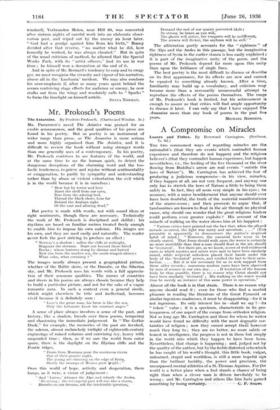A Compromise on Miracles
THE two commonest ways of regarding miracles are the
rationalist's (that they are events which contradict human experience and therefore do not happen) and the religious believer's (that they contradict human experience, but happen nevertheless, i.e., the feeding of the five thousand or the river flowing from Buddha's arrow are real events " outside the laws of Nature"). Mr. Carrington has achieved the feat of producing a judicious compromise—in his view, miracles, if they happen at all, are not very frequent, and anyway one only has to stretch the laws of Nature a little to bring them safely in. In fact, they all seem very simple in his eyes ; he assumes, with a naïve bewilderment that anyone should ever have been doubtful, the truth of the material manifestations of the seance-room ; and then proceeds to argue that, if tambourines are known to float in the air through no physical cause, why should one wonder that the great religious leaders could perform even greater exploits ? His account of the miracle of walking on the water shows him at his happiest :
" Various critics have pointed out the fact that, when the alleged miracle occurred, the light was misty and uncertain. . . ." (This preamble is apparently to demonstrate the author's sceptical habit of mind.) " However, the essential facts seem to be clearly stated. That Jesus should walk upon the water is certainly no more incredible than that a man should float in the air, should be levitated'. Yet there are, as we know, scores of well-evidenced cases in which mystics and saints were said to have been similarly raised, while sceptical onlookers placed their hands under the body of the 'levitated' person, and verified the fact to their satis- faction. . . . But it is not necessary for us to seek support from these older records ; numerous modern cases have been observed by men of science in our own day.. . . If levitation of the human body be thus possible, there is no reason why Christ should not have been similarly 'levitated' ; His walking on the water would thus be merely an instance of this same power in operation."
Almost all the book is in that strain. There is no reason why anyone should read it ; even for those who find a morbid pleasure in reading the literature of the Great Pyramid or similar ingenious madnesses, it must be disappointing—for it is not ingenious. Its only interest lies in—shall we say ?—its " token " value ; it is a specimen, characteristic in its gro- tesqueness, of one aspect of the escape from orthodox religion. Not so long ago Mr. Carrington and those for whom he writes would have found no difficulty with the most dogmatic cer- tainties of religion ; now they cannot accept them however much they long to ; they are no better, no more subtle or honest in intelligence, the progress is not in them but simply in the world into which they happen to have been born. Nevertheless, that change is happening ; and, judged not by the quality of the author, but by the feeble distorted echo which he has caught of his world's- thought, this little book, vulgar, unlearned, stupid and worthless, is still a more hopeful sign than the brilliant lucidity, the power and precision, the
unsurpassed. mental athletics of a St. Thomas Aquinas. For the world is a better place when a fool stands a chance of being right than when a clever man is driven inevitably to be wrong ; and Mr. Carrington and others Pike him hare -gained something by losing certainty. - - -C. P.- Snow










































 Previous page
Previous page